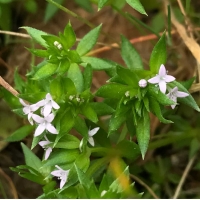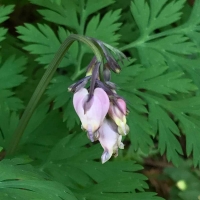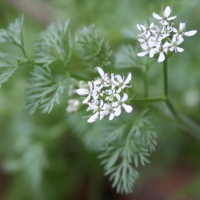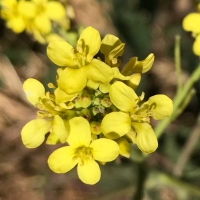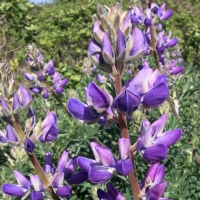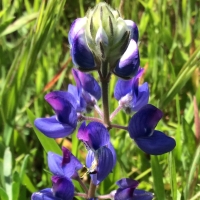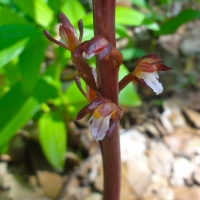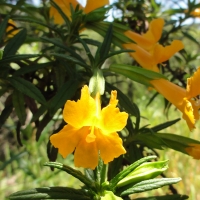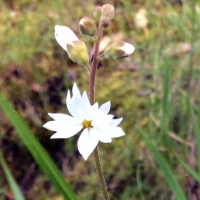NEW
– Field madder, native to the Mediterranean, is one of the very small flowers in the grass of meadows.
– Pacific bleeding heart is blooming under the redwood trees in the sliver of Land Trust between 435 and 441 Laverne.
– Shepherd’s needle, native to Eurasia, is blooming white with parsley foliage in meadows.
– Short podded mustard, native to the Mediterranean, has small clusters of yellow flowers on long stalks. In the mustard family, the flowers are delicious.
– Silver lupine is blooming purple in bushes up on the ridge.
– Sky lupine, bright blue with white accents, is blooming on the ridge.
– Spotted coralroot with its red stalk and many orchid-shaped flowers is coming up in forests.
– Sticky monkeyflower is blooming orange on bushes in meadows. It will bloom throughout the summer heat when its dark leaves will become sticky.
– Woodland star’s bright white stars are blooming in the seep on the edge of the Ridgewood Rock.
Forests
Starting
– California huckleberry with its small white lantern flowers is blooming in forests.
– False lily of the valley with its star white flower is coming up all over and will brighten the forests soon.
– Forget-me-nots, native to Europe, is one of our most successful invaders. Easy to pull, easiest to identify when it’s flowering, so pull it then.
– Giant trillium with blooms in cream or pink is blooming in forests
– Manroot, a native vine with large maple-shaped leaves is blooming white as it climbs.
– Milkmaids, a pretty white flower with arugula-tasting leaves is blooming in forests.
– Miner’s lettuce one of our most popular edibles, has a small white flower. Claytonia had a false start with the early season rains but is coming on well now that they are picking up.
– Pacific pea with pink and white flowers is blooming in forests
– White flowered onion*, edible and native to the Mediterranean, is blooming in wet spots with its white cone flowers. Pull it up by the roots if you can.
Peaking
– Fairy bells cream flowers hang below the leaves of this woodland plant.
– Indian warrior is a ruby carpet at 15 right along the Homestead Trail – that we finished clearing a few months ago.
– Scotch broom, native to Western Europe, one of the most aggressive invaders of our meadows is blooming with its yellow pea flowers. Pull it before it goes to seed if you can.
Fading
– Canyon gooseberry is blooming at the Ridgewood u-bend, trailhead to 13 and in the forests where huckleberry grows. The flowers are very small, blooming on almost bare branches as they emerge with the leaves.
– Oso berry, our native plum, is just starting to bloom on the Ridgewood Rock.
– Tasmanian blue gum, is blooming white high in the huge eucalyptus trees.
– Trillium are bright white or pale pink in their bed of three green leaves on the forest floor.
Forest edges
Starting
– Douglas iris with blooms from pale cream to rich purple is blooming in the forests
– Purple sanicle and its magenta puff flowers blooms in forests along the Homestead Trail
– Sourgrass*, native to South Africa, is blooming up on the ridge. Although fun to chew on for kids, this plant is a very successful non-native spreading in wet locations where natives might otherwise grow.
– Woodland strawberry blooms are starting now where there is sun, will persist for months in different habitats as they warm.
Peaking
– California blackberry is blooming with paper-white flowers, on a thinner, trailing vine than Himalayan blackberry.
– Spring gold is blooming yellow on the Ridgewood Rock and in ridge meadows.
Fading
– Barberry, hollylike leaves and clusters of fragrant, yellow flowers.
– Pacific hounds tongue with its forget-me-not-looking flowers and large leaves is blooming now in oak meadows. There are also tons of emerging leaves promising a big year for this wildflower.
Meadows
Starting
– Blue dicks is starting to bloom on Coyote Rock and along the Homestead Fire Road above the Waterview trailhead.
– Blue eyed grass, in the iris family, blooms purple with a yellow center
– California buttercup is starting to bloom bright yellow in meadows.
– California goldfields is just starting to bloom. When it’s peaking, carpets of bright yellow will cover the ground
– California plantain almost too small to see but getting very close is rewarded with the many translucent disks of its flower
– California poppy, one of the longest bloomers, is bright orange in meadows up on the ridge.
– Checkerbloom’s bright pink is starting to bloom on the ridges of Homestead Hill.
– Chickweed, native to Europe, medicinal and edible is blooming with its white star flower.
– Filaree*, native to the Mediterranean, has small purple flowers and blooms in disturbed areas like trails
– French broom, native to the Mediterranean, is one of our most aggressive invaders and also one of the easiest to pull.
– Ground iris is blooming purple in meadows.
– Oakland star tulip one of our rare plants, has a small delicate cup flower well worth scrutinizing in meadows.
– Suncups on the ground with yellow flowers is starting down near 13 but will be on the ridge and in meadows soon.
– Winter cress with bright yellow flowers and waxy leaves is blooming up on the ridge
– Woolly lomatium’s cream colored discs are blooming above Homestead Fire Road near Panoramic.
Peaking
– Footsteps of spring are bright yellow, hugging the ground up on the ridge.
– Fremont’s deathcamas is blooming white wherever a bit of meadow peaks out from the shrubs.
Fading
– Checker lily, brown lily-bell flower with leopard print cup. Look for it at the forest edge or sheltered in meadows.
– Marin checker lily with its chocolate bell flowers is blooming in the meadow below Amaranth.
– Shooting star with its bright pink flowers is blooming at trail junction 9, on the Ridgewood Rock and below Amaranth.
Key to map:
I haven’t located plants on on the map if they are very prolific. Find them by their habitat.
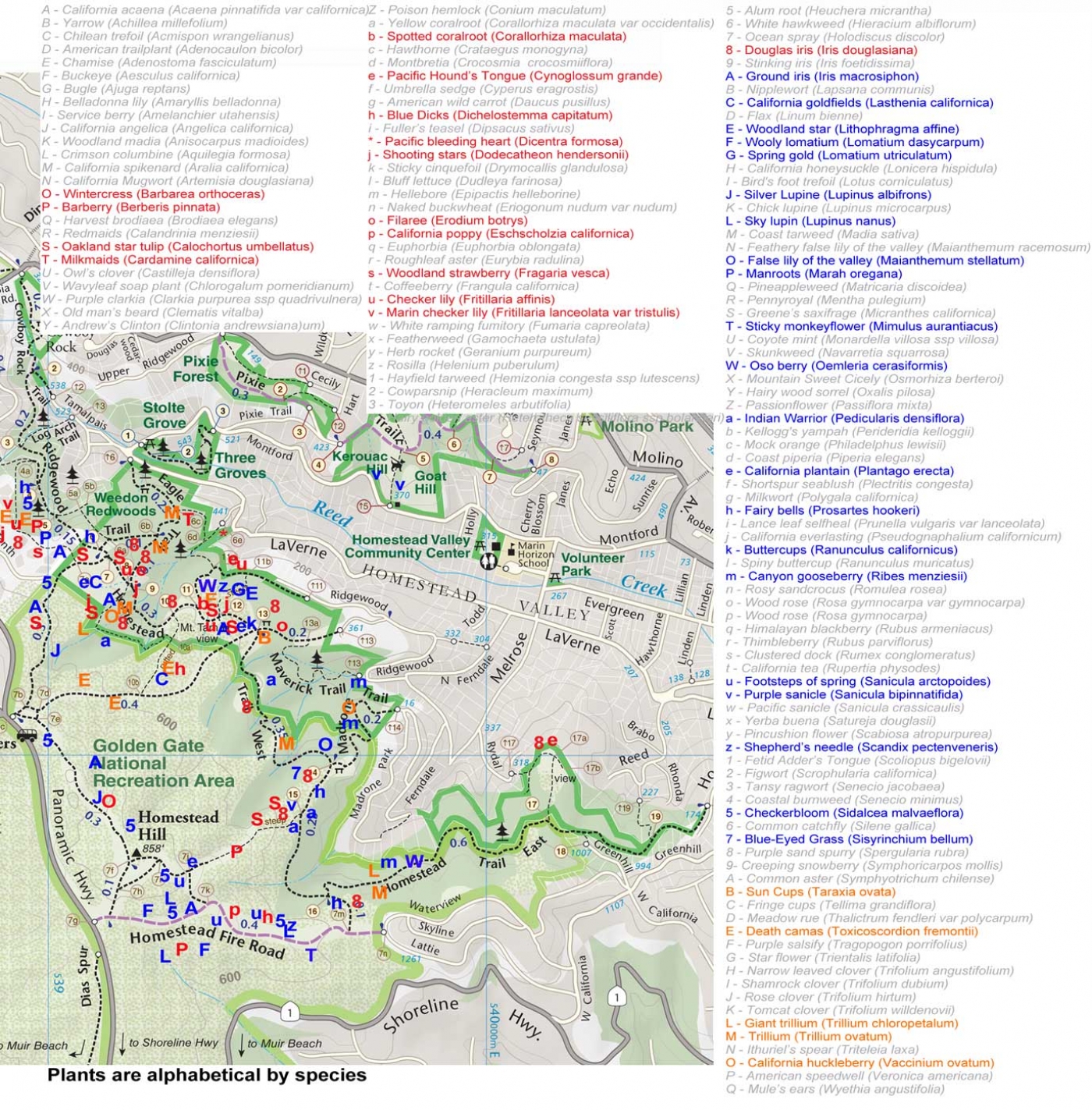
Gallery of wildflowers and plants found in Homestead.
*Non-native
Share this: